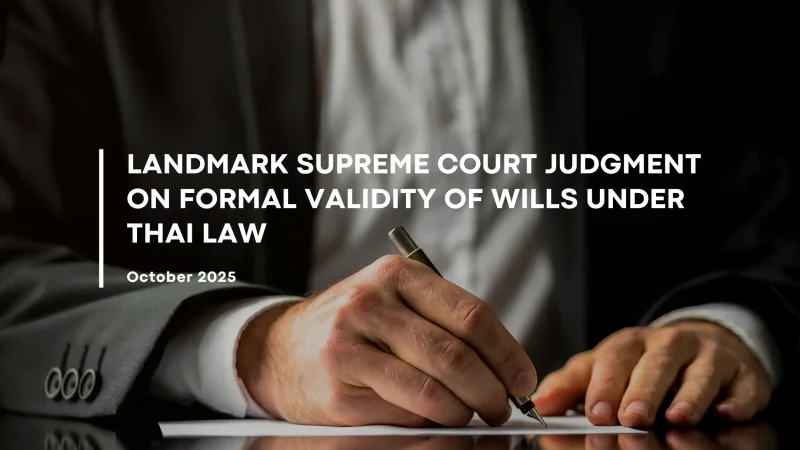Partnership Announcement: Mato Kotwani
Introduction
Singapore’s new Insolvency, Restructuring and Dissolution Act (hereinafter IRDA) came into force on 30 July 2020. Prior to the enactment of the IRDA, the insolvency provisions were dispersed among various enactments, the primary being the Companies Act and the Bankruptcy Act. The IRDA consolidates these personal and corporate insolvency laws; it repeals the Bankruptcy Act and also makes several amendments to other legislations to streamline the laws. It aims to introduce reforms and thus strengthen the insolvency and restructuring regime of the country. In addition to the streamlining of the insolvency laws, the IRDA has also made some significant amendments one of which is the new section 440 which restricts the applicability of ‘ipso facto’ clauses under certain circumstances. We will in the course of this short article, discuss what “ipso facto’ clauses are and how the changes will affect contracting parties in commercial dealings.
Ipso Facto clause
The term ‘ipso facto’ is a Latin word which means “by the fact itself”. In the insolvency context, ipso facto clauses refer to clauses, which are usually contained in a commercial contract which allow one party to terminate or modify the contract upon the other party’s insolvency. To illustrate this, if Party A and Party B enter into a commercial contract containing an ipso facto clause, if Party A subsequently becomes insolvent (i.e it is unable to pay its debts when they falls due), then Party B can rely on the ipso facto clause to immediately terminate the contract and to thereafter stop performing any further contractual obligations it may have owed under the contract.
Such ipso facto clauses have often proven detrimental to businesses which are technically insolvent and that are trying to undergo restructuring. These ipso facto clauses cause a cascading effect which makes it difficult for such companies to obtain rescue financing and to trade their way out of debt.
Before the enactment of the IRDA, such ipso facto clauses were not restricted. This was detrimental for struggling companies that sought to restructure their assets, as they lost valuable contracts due to this clause even though they might be in a position to fulfil their contractual obligations going forward. Therefore, to address this problem, the IRDA included section 440(1) which restricts the use of this clause to terminate contracts solely due to the insolvency of the counterparty.
The enactment of this provision aligns the country’s restructuring framework with that of countries like the UK, the US and Australia which place similar restrictions on ipso facto clauses.
Section 440 – Scope and Exceptions
Section 440 (1) provides that:
440. (1) No person may, at any time after the commencement, and before the conclusion, of any proceedings by a company —
(a) terminate or amend, or claim an accelerated payment or forfeiture of the term under, any agreement (including a security agreement) with the company; or
(b) terminate or modify any right or obligation under any agreement (including a security agreement) with the company,
by reason only that the proceedings are commenced or that the company is insolvent.
Following on from the illustration above, section 440 would prohibit Party A from immediately terminating, amending or modifying the rights and liabilities of Party A and B under their contract by the sole reason that Party B has become insolvent (or that insolvency proceedings have been filed against Party B). Furthermore, Party A would also be prevented from demanding accelerated payments by the sole reason of Party B’s insolvency.
Section 440 does not however absolve the insolvent party (Party B) from performing its other contractual obligations. Therefore, Party B will still have to continue performing all of its contractual obligations. Any breach by the insolvency party (Party B) of its contractual obligations (e.g making of payments as and when they fall due) may still give rise to a breach which may entitle the counterparty (Party A) to terminate the agreement.
Further, this provision only restricts termination by way of an ipso facto clause; it does not prohibit the counterparty from terminating by reason of other grounds like fraud.
Section 440(6) defines the term ‘proceedings’ which include applications for a judicial management and any scheme of arrangement of compromise between a company and its creditors. This subsection is meant to prevent parties from being creative with their ipso facto clauses and limiting them to events such as judicial management or a scheme of arrangement. In simple terms, this means that if a company (Party B) is undergoing judicial management or a scheme of arrangement or any other proceedings within the ambit of section 440 (6), then similarly, the counterparty (Party A) cannot rely on any ipso facto clause to terminate the contract.
Section 440 (3) has also been included to prevent parties from creatively drafting ipso facto clauses to circumvent the protections found in section 440 (1). Such creatively drafted ipso facto clauses may not necessarily use ‘insolvency’ in its technical sense of balance sheet or cash flow insolvency. Section 440(3) prohibits these ipso facto clauses as well. To this end, section 440 (3) states that:
(3) Any provision in an agreement that has the effect of providing for, or permitting, anything that, in substance, is contrary to this section is of no force or effect.
Anticipatory Breach as a Possible Loophole
Whilst section 440 goes a long way in preventing parties from relying on ipso facto clauses, section 440 does not explicitly prohibit a party from terminating on the basis of anticipatory breach.[1] This could potentially lead to commercial contracts breaking down contractual obligations into smaller component parts or bloating contracts with additional obligations to set up ‘tripwires’ which may then give the counterparty (Party B) a basis for terminating a contract due to an anticipatory breach in the event that Party A is insolvent or close to insolvency.
Pragmatically, the provision would benefit a corporation that applies for restructuring via a scheme of arrangement or judicial management before defaults arises. If a company applies for restructuring after the default arises, it will be unlikely to be able to rely on protection granted by this clause. Further, section 440 does not prevent a party from relying on its right to terminate a contract where some other events of default (not insolvency) have occurred. This is an important practical limit on the application of section 440.
Effect of Section 440 on Existing Contracts
A contract will not be rendered void or invalid in its entirety due to the presence of an ipso facto clause falling within the scope of section 440. Only the said clause will be rendered invalid and unenforceable; all other provisions not relating to the ipso facto clause remain enforceable. This means that existing contracts containing ipso facto clauses will continue to be valid and enforceable in all other aspects other than the ipso facto clause.
Carve-outs
There are certain exceptions on the application of Section 440(1) that are provided in the provision itself:
- Sub-section (4) allows a party to obtain a declaration from Court that Section 440 does not apply if the restriction under sub-clause (1) is likely to cause significant financial hardship; and
- Under sub-section (5), certain forms of contracts are excepted from being subject to sub-section (1), such as certain financial contracts, commercial charters, contracts to which the Government or a statutory body is a party and any contract that may affect the national or economic interest.
The Insolvency, Restructuring and Dissolution (Prescribed Contracts under section 440) Regulations 2020 provide for a list of contracts for the purpose of section 440(1). However, if a particular type of contract is not mentioned in these regulations, it may be outside the scope of application of the sub-section (1).
Conclusion
The introduction of section 440 of the IRDA, is a positive step towards strengthening the current insolvency restructuring framework in Singapore. This new provision of the IRDA, is necessary for ensuring that genuine restructuring efforts are not thwarted. That being said, the practical effects of the new provision are yet to be seen. The possibility of parties trying to circumvent such clauses through tighter drafting of their commercial contracts to ‘tripwire’ the counterparty into a potential anticipatory breach situation remains a real possibility and therefore the practical effects of this new provision will take some time yet to be seen.
[1] Chong Yi-Hao Clayton, Section 440 of the IRDA: Restrictions on Ipso Facto Clauses, SAL Prac 27, available at https://journalsonline.academypublishing.org.sg/Journals/SAL-Practitioner/Insolvency-and-Restructuring/ctl/eFirstSALPDFJournalView/mid/596/ArticleId/1477/Citation/JournalsOnlinePDF

